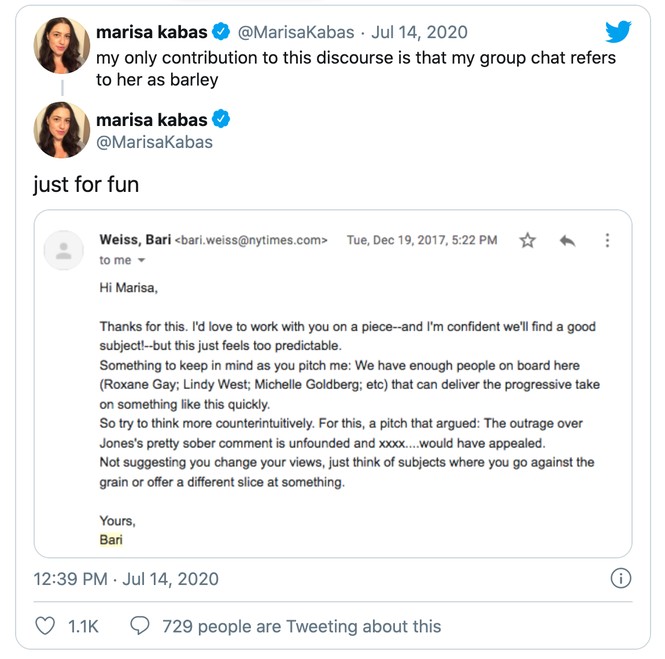Bari Weiss likely didn't begin her career at the New York Times in 2017 with the idea that only three years later, she'd be leaving her post after being called a "Nazi" and a "racist" by her co-workers. But that is exactly what has happened.
Weiss walked away from her high profile post as an editor of the Opinion pages of the Times on Tuesday. And she didn't go quietly; she posted a scathing resignation letter addressed to publisher A.G. Sulzberger on her personal website. In the letter, Weiss decried the "orthodoxy" of the New York Times, a paper, she said, that should have been learned a lesson from the 2016 election, a lesson she said they ignored entirely.
But the lessons that ought to have followed the election—lessons about the importance of understanding other Americans, the necessity of resisting tribalism, and the centrality of the free exchange of ideas to a democratic society—have not been learned. Instead, a new consensus has emerged in the press, but perhaps especially at this paper: that truth isn’t a process of collective discovery, but an orthodoxy already known to an enlightened few whose job is to inform everyone else.
Weiss, who was hired under the guise of bringing varied political opinions to the newspaper after the election of President Trump, said that being a political centrist in the New York Times newsroom had become so toxic that she was bullied for having opinions not espoused by the far left faction of the staff.
Weiss described the newsroom of the New York Times as something that smacked of an Orwellian nightmare, a chamber of ideology and extreme leftism. Weiss also pointed to social media as being an unnamed arbiter of political thought being expressed by the paper.
Recommended
Twitter is not on the masthead of The New York Times. But Twitter has become its ultimate editor. As the ethics and mores of that platform have become those of the paper, the paper itself has increasingly become a kind of performance space. Stories are chosen and told in a way to satisfy the narrowest of audiences, rather than to allow a curious public to read about the world and then draw their own conclusions. I was always taught that journalists were charged with writing the first rough draft of history. Now, history itself is one more ephemeral thing molded to fit the needs of a predetermined narrative.
While conservatives learned years ago that the New York Times had abandoned all pretense of being an unbiased outlet for news and analysis, Weiss's resignation proves that there is no more room for any dissenting thought in the publication.
The fate of Weiss's career with the Times was sealed when Republican Senator Tom Cotton wrote his thoughts about what needed to be done to end violence in the streets following the killing of George Floyd. Instead of backing up their choice to publish a sitting U.S. senator with a conservative point of view, the newspaper bowed to pressure from a letter written by their own outraged staff. It resulted in the resignation of James Bennet, then the Editorial Page editor, and a retraction of Cotton's article with an apology from Sulzberger.
The choice to pull Cotton's op-ed was not just another eye-rolling moment of leftist cancel culture from an increasingly biased newspaper. It was definitive proof that the goal of the New York Times was no longer to participate in the exchange of ideas but simply broadcast what they deemed to be the correct political theology of the day.
Having even dared to argue the points being made by the most activist, leftwing, ideological thinking in the newsroom, Weiss claimed, made her the subject of anti-Semitic bullying and castigation by her very own co-workers. After signing a letter in Harper's Magazine that made a full-throated argument against cancel culture stemming from dissenting thought, Weiss was repeatedly and persistently berated by other "woke" journalists and staff at the New York Times, including Pulitzer Prize winning author of the historical revisionist "1619 Project" Nikole Hannah-Jones.
Lol.
— Ida Bae Wells (@nhannahjones) July 15, 2020
In a now deleted tweet, a freelance opinion columnist also tried to smear Weiss for rejecting her monotone progressive rant years ago, sharing a response that highlighted Weiss's interest in creating a marketplace of ideas.

For her years of effort to bring an array of thoughts and opinions to one of the nation's most circulated papers, Weiss was bullied, resisted, and eventually pushed out the door. But her letter has ripped open the skin of the mainstream media and exposed the nerve pulsating with the single-minded, unoriginal idea that all leftist outlets are simultaneously embracing: the idea that this country is fundamentally broken, that our history is wrong, and that no one can be woke enough to pass the purity test.
But as Weiss pointed out, that isn't America. That's just the ideal of the New York Times and its staff who have taken control of the newsroom to create the narrative du jour. The country is still full of ideas, opinions, thoughts, and glory; just don't expect to find those things at the New York Times, or any other outlet that has eviscerated free thought and discourse in favor of leftist activism.

























Join the conversation as a VIP Member